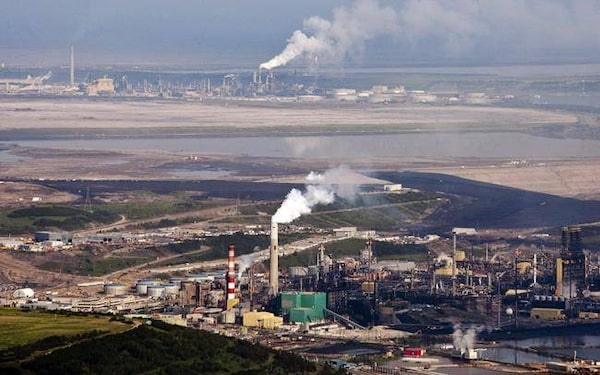
The Suncor oil sands facility seen from a helicopter near Fort McMurray, Alta., Tuesday, July 10, 2012. The federal cabinet is facing mounting pressure from Liberal colleagues to reject the latest project.The Canadian Press
Alberta has offered to bring its oil sands emissions cap into force, but says doing so will only be a priority if Ottawa approves the proposed Frontier oil sands mine.
The provincial government made the bid Friday to ensure it has done everything it can to influence the federal cabinet’s decision on the mine from Teck Resources Ltd.
Provincial Environment Minister Jason Nixon said he made the pitch to his federal counterpart, Jonathan Wilkinson, in a phone call Friday. The offer comes just days before cabinet will decide whether to approve, reject or delay a decision on the proposed mine, which would add 4.1 megatonnes annually of greenhouse gas emissions but be an economic boon for the sector.
The mine has landed the federal government in the crosshairs of proponents and opponents alike. Supporters say Prime Minister Justin Trudeau’s decision on the mine will be a key test of his commitment to Alberta and national unity, while detractors say it will be a measure of his sincerity in tackling climate change.
“We are prepared to regulate on the oil sands cap which is what the ask is,” Mr. Nixon said Friday. Alberta agreed to the cap in conjunction with Ottawa’s approval of the Trans Mountain pipeline expansion in 2016. While the legislature passed the bill creating the cap, the provincial government never regulated it.
Mr. Wilkinson didn’t make the regulated cap a condition of Frontier’s approval, but said he had concerns about it in relation to the project and its emissions, Mr. Nixon said.
But in a statement, Mr. Wilkinson made it clear Ottawa views the enforcement of the cap as a previous commitment from Alberta.
“When the Trans Mountain Expansion pipeline project was approved by our government, it was understood that Alberta would implement its 100 million tonne cap on oil sands emissions,” Mr. Wilkinson said in an e-mailed statement.
“Cabinet is considering the Teck Frontier project based on its merits and will make a decision by the end of this month. It will take into account all circumstances and information available, as required by the law."
The federal cabinet is facing mounting pressure from Liberal colleagues to reject the project. A joint federal-provincial regulatory review panel found the mine is in Alberta’s public interest, but warned it would have “significant adverse” environmental effects on the environment. That finding pushed the final decision to the federal cabinet.
The ‘yes’ or ‘no’ decision could have an impact reaching far beyond this particular project.
On Friday, Alberta Premier Jason Kenney said a veto would “send a devastating message to prospective investors in this country.” That sentiment is shared by analysts who say the potential impact of cabinet’s decision on the Frontier project is likely greater than the project itself.
Oil market analyst Kevin Birn of IHS Markit said the decision will influence investor sentiment toward the oil patch both from outside and inside Canada. Mr. Birn said the risk profile of projects increases if the perception is that the regulatory approval process isn’t transparent.
The potential for cabinet’s decision to send negative signals to the market is compounded by other issues that are already leaving investors wary, namely: the continuing rail blockades against the Coastal GasLink pipeline project, and the fact that Canada had to nationalize the Trans Mountain pipeline to ensure its construction, according to Richard Masson, an executive fellow at the University of Calgary’s public policy school.
The “most important thing,” Mr. Masson said, is that there is an approval system that “people can count on.”
We have a weekly Western Canada newsletter written by our B.C. and Alberta bureau chiefs, providing a comprehensive package of the news you need to know about the region and its place in the issues facing Canada. Sign up today.